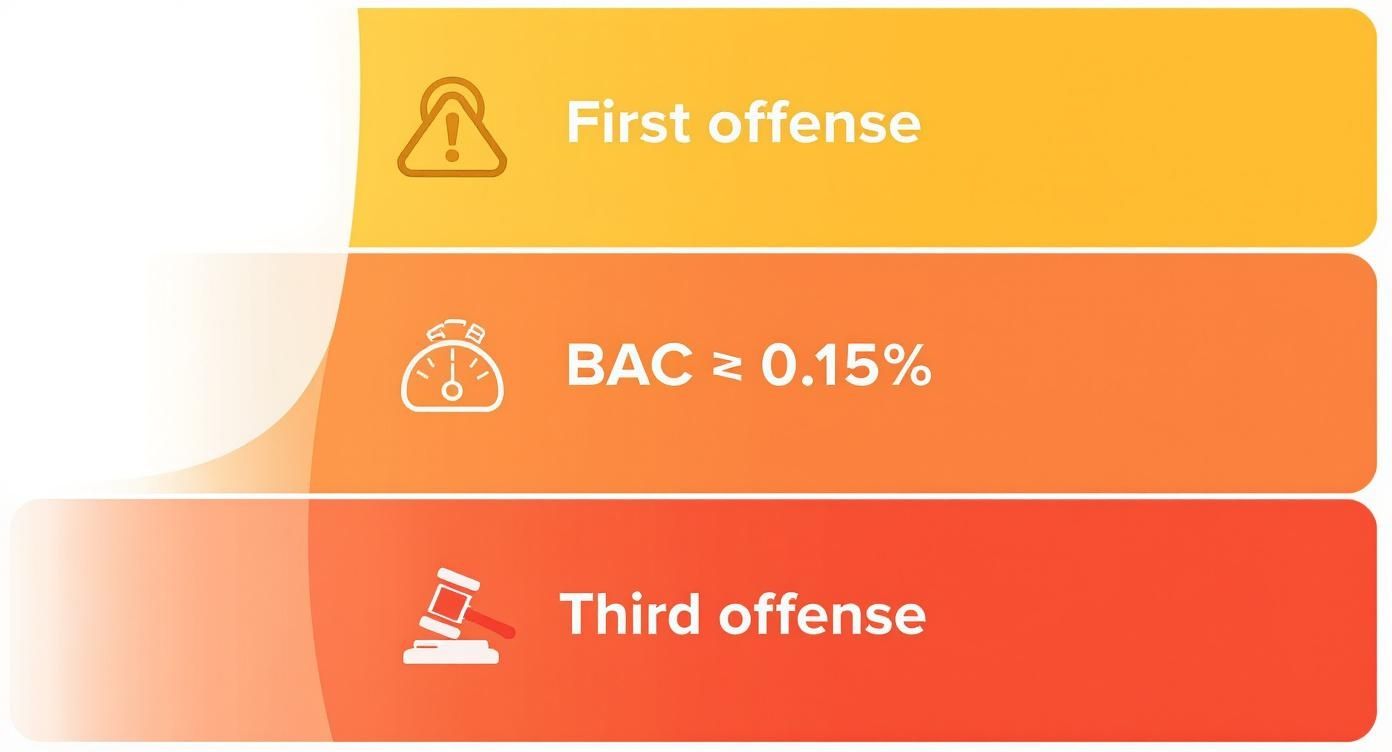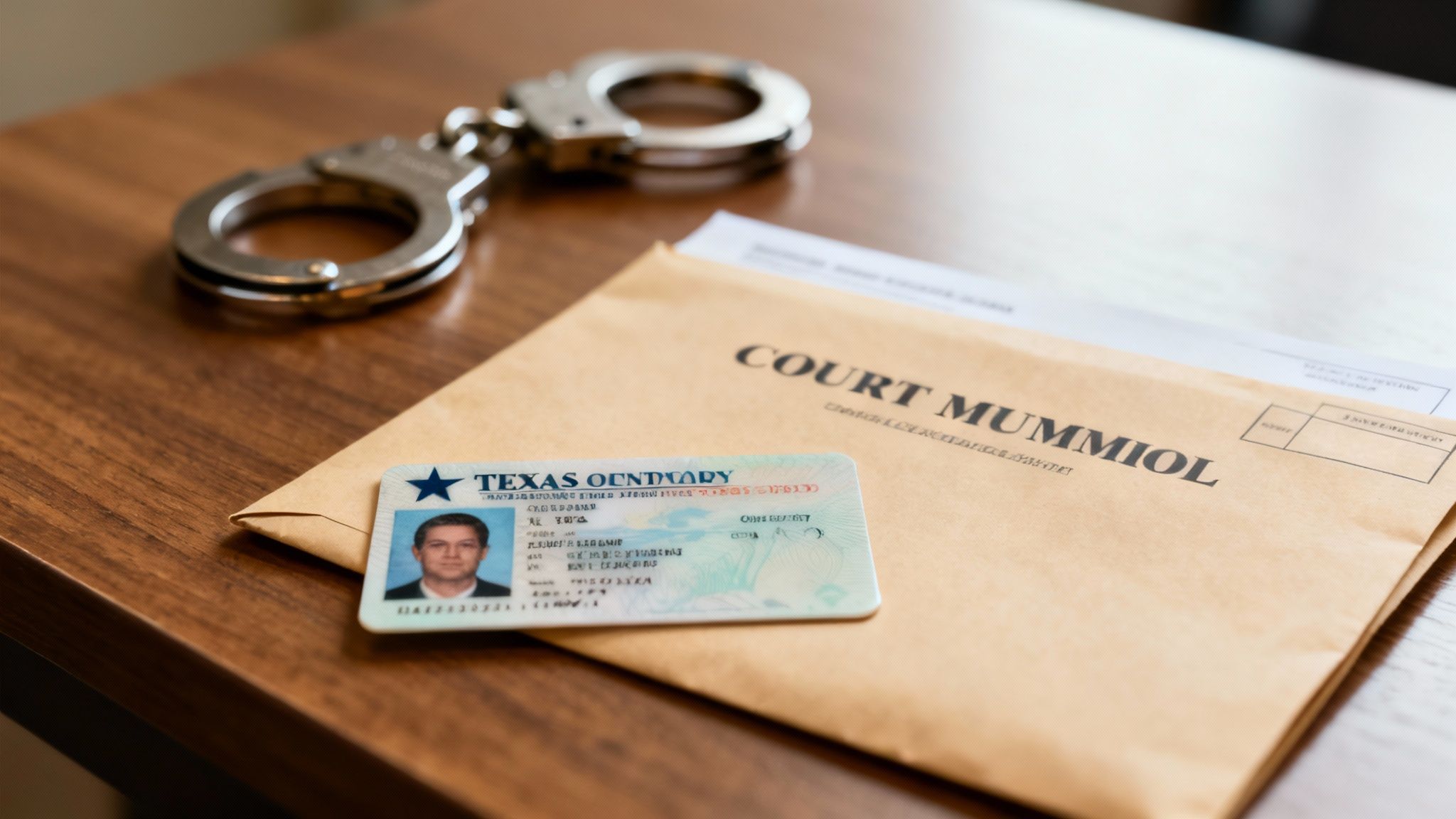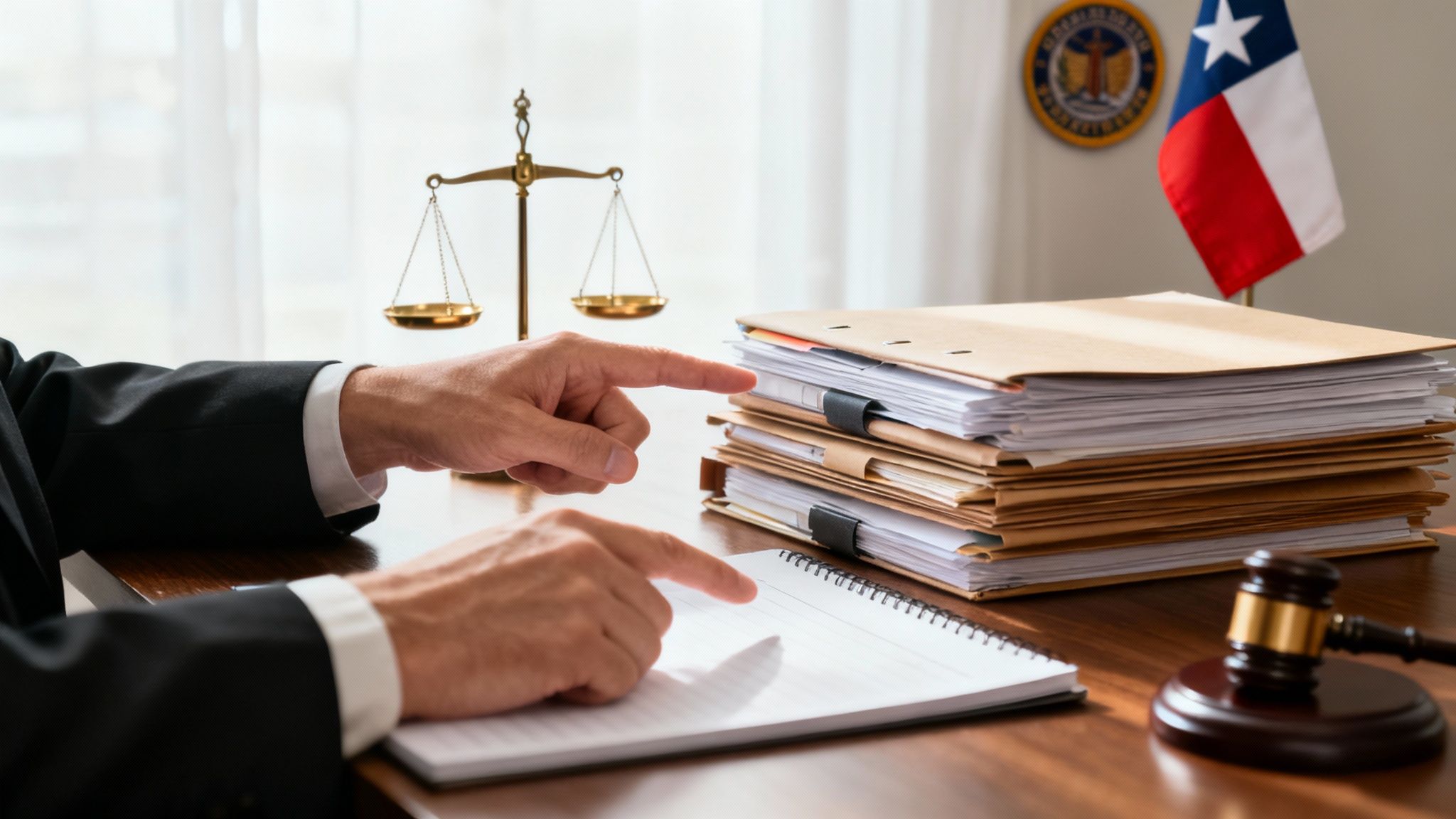A DWI arrest can be overwhelming—but you don’t have to face it alone. Understanding the potential consequences is the first step toward building a defense that protects your future. DUI punishment in Texas is a structured system with escalating penalties that depend on the specifics of your case, like your Blood Alcohol Concentration (BAC) and any prior offenses.
Remember, an arrest is not a conviction. A strategic legal defense can make all the difference.
Your Guide to Navigating Texas DWI Penalties
Being arrested for a DWI in Texas starts two separate legal battles. First, there's the criminal case, which determines guilt or innocence and could lead to jail time and fines. At the same time, you face an administrative case that decides the fate of your driver's license.
The potential penalties can feel crushing, threatening your freedom, finances, and future. But knowing exactly what you're up against is the key to taking back control.
Our goal is to cut through the legal jargon and bring clarity to this confusing process. From a first-time DWI to a felony charge, we’ll break down the consequences you’re facing and explain why having an experienced Houston DWI lawyer on your side is your most critical asset.
Understanding the Escalation of Penalties
Texas law gets tougher with each DWI offense. The punishments follow a clear ladder of severity based on the circumstances of your arrest and your history.
For instance, a first DWI is a serious charge, but a third DWI is automatically a felony with consequences that can alter your life. This escalating system is why it's so important to fight every charge aggressively from day one.
The infographic below gives you a clear visual of how these penalties climb.

As you can see, factors like a high BAC or prior convictions dramatically increase the severity of the charges and punishments.
To make this even clearer, let's break down the potential criminal penalties in a simple table.
Texas DWI Penalties Explained
This table provides a snapshot of the potential criminal penalties for first, second, and third DWI offenses in Texas. Notice how the consequences jump significantly with each subsequent charge.
| DWI Offense | Classification | Potential Jail Time | Maximum Fine | License Suspension Period |
|---|---|---|---|---|
| First DWI | Class B Misdemeanor | 3 to 180 days | Up to $2,000 | 90 days to 1 year |
| Second DWI | Class A Misdemeanor | 30 days to 1 year | Up to $4,000 | 180 days to 2 years |
| Third DWI | 3rd Degree Felony | 2 to 10 years in prison | Up to $10,000 | 180 days to 2 years |
It's important to remember that these are just the standard criminal penalties. A conviction can also bring other consequences, like annual surcharges to keep your license, mandatory DWI education classes, and the installation of an ignition interlock device. For a deeper dive into the specifics, you can explore the official Texas DWI statutes.
Understanding the Language of a Texas DWI Case
After a DWI arrest, you're suddenly faced with legal terms that can feel confusing and intimidating. Understanding this language is the first step toward taking control and building a strong defense.
Let's define the key terms you will likely encounter. Knowing what they mean will help you understand the charges against you and the evidence the state plans to use.
Blood Alcohol Concentration and Implied Consent
Blood Alcohol Concentration (BAC) is a measurement of the amount of alcohol in your system. In Texas, the legal limit for most drivers is 0.08%. If your BAC is at or above that level, you are considered legally intoxicated, regardless of how sober you feel.
The stakes get higher if your BAC is 0.15% or more. This is a legal enhancement that can elevate a standard misdemeanor to a more serious charge, bringing steeper fines and a greater risk of jail time.
You'll also hear the term Implied Consent. Under Texas law, by having a driver's license, you have automatically agreed to provide a breath or blood sample if lawfully arrested for DWI. Refusing the test doesn’t make the problem go away. Instead, it triggers an immediate and separate consequence: an automatic driver's license suspension.
Field Sobriety Tests and Administrative License Revocation
During a traffic stop, an officer may ask you to perform Field Sobriety Tests (FSTs). These are physical and mental exercises—like walking a straight line or following a pen with your eyes—designed to test your coordination. However, these tests are often conducted in stressful situations on uneven surfaces with flashing lights. They are highly subjective, and their reliability is often successfully challenged in court.
An arrest is not a conviction. The results of field sobriety tests, breathalyzers, and blood draws can often be challenged on procedural or scientific grounds. A skilled attorney will scrutinize every piece of evidence.
Finally, you must know about the Administrative License Revocation (ALR). This is a civil process handled by the Texas Department of Public Safety (DPS), completely separate from your criminal DWI case. The ALR process begins if you fail a chemical test (BAC of 0.08% or higher) or refuse one.
Here’s the critical part: you have only 15 days from the date of your arrest to request a hearing to fight this suspension. If you miss that deadline, your license will be suspended automatically, long before your criminal case is resolved.
While people often use "DWI" and "DUI" interchangeably, there are important legal differences. For a deeper dive, you can learn more about the distinctions between DUI and DWI in Texas in our detailed guide.
Penalties for a First DWI Offense in Texas
For many Texans, a DWI arrest is their first encounter with the criminal justice system, leaving them feeling lost and uncertain. If you are in this position, it’s important to know that a first DWI in Texas is typically charged as a Class B Misdemeanor, assuming there are no aggravating factors.
However, do not underestimate a misdemeanor charge. The potential penalties are significant and can disrupt your life, impacting your freedom, finances, and ability to drive.
Standard Criminal Penalties for a First Offense
The Texas Penal Code outlines a clear range of punishments for a standard first-time DWI. This is the baseline of what a prosecutor will seek in court.
- Jail Time: A conviction carries a mandatory minimum of 72 hours in county jail, with a sentence of up to 180 days.
- Fines: The court can impose a fine of up to $2,000, not including additional court costs and fees.
- License Suspension: You could lose your driver's license for 90 days to a full year.
These penalties are serious, but they are not always set in stone. An experienced Texas DUI attorney can often negotiate alternatives to the harshest outcomes, such as probation instead of jail time.
How a High BAC Increases Penalties
The details of your arrest are crucial, and your Blood Alcohol Concentration (BAC) is one of the most significant factors. Texas law draws a clear line at 0.15%. If your BAC was at or above this level, the charge is automatically enhanced.
A first-time DWI with a BAC of 0.15% or higher is elevated from a Class B to a Class A Misdemeanor. This enhancement seriously raises the stakes and the potential consequences you're facing.
This more serious charge comes with much steeper penalties:
- Jail Time: The maximum jail sentence increases to one year.
- Fines: The maximum fine doubles to $4,000.
This automatic upgrade shows how seriously the state takes high-BAC offenses. Prosecutors tend to be more aggressive in these cases, making a strong legal defense even more critical.
The True Cost of a First-Time DWI
Court-ordered fines are often just the beginning. A DWI conviction comes with a long list of other costs that can add up quickly. These "hidden" penalties can be just as burdensome as the criminal sentence itself.
| Cost Category | Estimated Financial Impact |
|---|---|
| Bail Bond | $500 – $2,000 |
| Towing and Impound Fees | $300 – $1,000+ |
| Legal Fees | $2,500 – $15,000+ |
| Probation Fees | $60 – $100 per month |
| DWI Education Class | $100 – $200 |
| Ignition Interlock Device | $1,000 – $1,500 per year |
| License Reinstatement Fees | $125+ |
| DPS Annual Surcharges | $1,000 – $2,000 per year for 3 years |
| Increased Car Insurance | $1,000 – $2,500 extra per year |
| Total Estimated Cost | $7,000 – $25,000+ |
As you can see, the financial fallout extends far beyond the initial fine. These added expenses include:
- Probation Fees: If you receive probation, you will pay monthly supervision fees for the entire term.
- Mandatory DWI Education: You will be required to complete and pay for a 12-hour DWI education course.
- Ignition Interlock Device (IID): A judge may order you to install an IID in your car. You are responsible for installation and monthly monitoring fees, which can easily exceed $1,000 per year.
- Annual License Surcharges: For three years following a conviction, the Texas DPS can charge you significant annual fees just to keep your license.
Understanding the true cost of a first-time DWI is essential. While it can all seem overwhelming, remember: an arrest is not a conviction. With a strategic defense from a knowledgeable Houston DWI lawyer, you can challenge the evidence, protect your rights, and work to minimize these consequences.
How Penalties Escalate for Subsequent DWI Offenses

While any DWI charge in Texas is serious, the state treats repeat offenses with far greater severity. The legal system views a second or third DWI not as another mistake but as a pattern of dangerous behavior. As a result, prosecutors become more aggressive, and judges have less room for leniency.
If you are facing another DWI charge, the stakes are dramatically higher. Understanding exactly how these penalties escalate is the first step in building a defense with a skilled Texas DUI attorney.
The Jump to a Second DWI Charge
A second DWI conviction is elevated to a Class A Misdemeanor. This is a significant leap from a first offense, bringing tougher punishments and, most critically, mandatory jail time.
Unlike a first DWI where you might avoid spending time in jail, a second conviction includes penalties such as:
- Mandatory Jail Time: A sentence of 30 days to one year in county jail.
- Hefty Fines: A fine of up to $4,000, double the maximum for a typical first offense.
- Lengthy License Suspension: Your driver’s license can be suspended for 180 days to two years.
- Ignition Interlock Device (IID): You will almost certainly be required to install an IID on your vehicle for at least a year.
With a second DWI, the prosecution’s goal shifts from rehabilitation to punishment. They will use your prior conviction to argue that you are a continued risk to the public, making it very difficult to negotiate a lighter sentence.
A Third DWI Is Always a Felony
The most severe escalation in DUI punishment in Texas occurs with a third conviction. A third DWI, regardless of how much time has passed since your last one, is automatically charged as a third-degree felony. This is a life-altering event that moves your case from a county court to a district court, where the consequences are far more severe.
A felony conviction creates a permanent criminal record that can strip you of fundamental rights and negatively impact future employment, housing, and educational opportunities.
The penalties for a third-degree felony DWI include:
- State Prison Time: A sentence of two to 10 years in a Texas state prison.
- Substantial Fines: A fine of up to $10,000.
- Driver's License Suspension: A suspension that can last from 180 days up to two years.
- Permanent Criminal Record: This conviction can never be sealed or expunged from your record.
A felony DWI conviction follows you for life. It can prevent you from voting, owning a firearm, or obtaining certain professional licenses. Fighting to avoid this outcome isn't just about staying out of prison—it's about protecting your entire future.
This firm stance reflects a nationwide concern over repeat drunk driving. For example, repeat offenders account for 27% of all DUI arrests nationally. Statistics like these explain why states like Texas have implemented such harsh penalties for repeat offenses. You can discover more insights about national DUI arrest trends to see the bigger picture.
Facing a second or third DWI can feel hopeless, but an aggressive legal defense is your best option. An experienced DWI lawyer will scrutinize every piece of evidence, from the legality of the initial traffic stop to the validity of the prior convictions being used against you.
When Does a DWI Become a Felony?
Most first-time DWIs in Texas are misdemeanors. However, certain situations, known as aggravating factors, can instantly upgrade a standard DWI to a felony charge—even with a clean record.
This changes everything. A felony charge means you are no longer just fighting to avoid a license suspension; you are fighting to stay out of state prison. Understanding what triggers this escalation is the first step in building a serious defense.
DWI with a Child Passenger
This is one of the most common ways a DWI becomes an automatic felony. The law is clear and unforgiving on this point.
If you are arrested for DWI with a passenger under the age of 15, the charge is immediately elevated to a state jail felony.
It doesn’t matter if you were driving perfectly or if the child was unharmed. The mere presence of a minor is enough to transform the charge. The potential consequences are severe:
- Jail Time: 180 days to two years in a state jail facility.
- Fines: Up to $10,000.
- A Lifelong Felony Record: This conviction follows you forever, impacting your rights and future opportunities.
Prosecutors do not need to prove you intended to endanger the child. They only need to prove a child under 15 was in the vehicle while you were intoxicated.
Intoxication Assault and Manslaughter
The legal stakes skyrocket when a DWI incident results in injury or death. At this point, the case moves far beyond a simple DWI and becomes a violent crime with some of the heaviest punishments under Texas law.
Intoxication Assault: If you are accused of causing an accident while intoxicated that results in someone suffering a "serious bodily injury," you will face charges for Intoxication Assault. This is a third-degree felony.
- Punishment includes two to 10 years in prison and a fine of up to $10,000.
- A "serious bodily injury" is an injury that creates a substantial risk of death, causes permanent disfigurement, or leads to long-term impairment of a body part or organ.
Intoxication Manslaughter: This is the charge when an accident caused by an intoxicated driver leads to someone's death. As a second-degree felony, the penalties are even more devastating:
- Punishment ranges from two to 20 years in state prison and a fine up to $10,000.
Texas experiences a high number of alcohol-related fatalities. In just one year, the state recorded over 1,200 such deaths, with nearly 25% of all fatal crashes involving an intoxicated driver.
These statistics are why the state prosecutes these cases so aggressively. When you're facing charges this severe, a strong legal defense is non-negotiable. To protect your future, it is vital to understand all the aggravating factors in Texas DUI cases that can elevate the charges against you.
How an Experienced Lawyer Can Fight Your DWI Charge
Facing a DWI charge can feel final, but an arrest is not a conviction. It is the start of a legal process, and a strategic defense can completely change the outcome. An experienced Houston DWI lawyer doesn’t just accept the state’s evidence—they challenge every piece of it to protect your rights.

The defense process starts at the very beginning: the traffic stop. If the officer did not have a valid, legal reason to pull you over, any evidence gathered afterward—including sobriety test results and the arrest itself—could be thrown out of court.
From there, your attorney will scrutinize every step the officer took, searching for procedural errors and violations of your rights. The goal is simple: create reasonable doubt and weaken the prosecution's case against you.
Challenging the Evidence Against You
The prosecution's case typically rests on a few key pieces of evidence, but none of it is unbeatable. A skilled lawyer knows where to find the weaknesses.
- Contesting Field Sobriety Tests: These tests are notoriously subjective. Factors like poor lighting, uneven surfaces, nervousness, or a pre-existing medical condition can easily lead to a "failure." Your attorney can argue that these tests are not an accurate measure of intoxication.
- Questioning Breathalyzer and Blood Tests: Chemical test results may seem scientific, but they are prone to error. Breathalyzers require precise calibration and maintenance, and blood samples can be contaminated or improperly handled. Your lawyer will demand and analyze these records to challenge the validity of the BAC reading.
How to Fight a DWI License Suspension
While the criminal case proceeds, you also have a separate, urgent battle to save your driver's license. After a DWI arrest, you have only 15 days to request an Administrative License Revocation (ALR) hearing.
Failing to request an ALR hearing in time results in an automatic license suspension. An attorney can represent you at this hearing, challenge the evidence, and fight to keep you on the road.
This hearing is your first and best chance to contest the license suspension. It’s also an opportunity for your attorney to question the arresting officer under oath, gathering valuable testimony that can be used to strengthen your criminal defense. Exploring the various strategies for defending DUI charges in Texas is the best way to understand how a proactive defense works.
Ultimately, the goal is to secure the best possible outcome for your situation. That might mean negotiating for a reduction of charges, fighting for a dismissal, or preparing a powerful case for trial. Taking immediate action with the right legal team is the most effective way to minimize DUI punishment in Texas.
Common Questions About Texas DWI Punishments

After a DWI arrest, your mind is likely racing with questions. The uncertainty about what comes next can be one of the most stressful parts of the experience. Here, we provide clear, straightforward answers to some of the most pressing concerns about DUI punishment in Texas.
Our goal is to give you the information you need to make empowered decisions. Knowledge is your first and best tool for navigating this challenging time.
Can I Refuse a Breathalyzer Test in Texas?
Yes, you have the right to refuse a breathalyzer or blood test. However, this decision has immediate consequences. Under Texas’s implied consent law, refusing the test automatically triggers a driver's license suspension. For a first-time refusal, the suspension is 180 days.
While refusing denies the prosecution a key piece of evidence—your BAC—you must act quickly. You have a very short window to request an ALR hearing to challenge that suspension. An attorney can help you fight to keep your license while building a stronger criminal defense.
Will I Go to Jail for a First DWI in Texas?
Not necessarily. While a conviction for a first DWI in Texas carries potential jail time, it is often avoidable if there are no aggravating factors in your case. A skilled attorney can frequently negotiate for alternatives to jail.
These alternatives often include probation, which comes with conditions like completing DWI education classes, performing community service, and possibly installing an ignition interlock device. The goal is to argue for a sentence that allows you to maintain your life without serving jail time.
Can a DWI Be Removed From My Record?
Yes, but only under specific circumstances. A DWI conviction remains on your Texas record forever. However, if your case is dismissed or you are found not guilty at trial, you may be eligible for an expunction, which completely destroys all records of the arrest.
In some cases, a person might receive deferred adjudication probation for a first-time DWI. If completed successfully, the record could be sealed with an order of non-disclosure, hiding it from public view. This is why it is so critical to fight DWI Texas charges from the very beginning.
A DWI arrest can feel like a defining moment, but it doesn't have to define your future. At The Law Office of Bryan Fagan, PLLC, we believe in providing a strategic, assertive defense to protect your rights and minimize the consequences. You don’t have to face this alone. Request a free, confidential consultation to understand your options and take the first step toward protecting your future. Visit us at https://texasduilawfirm.com today.

